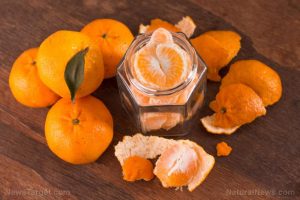
Advertisement
Superfoods are beloved by health enthusiasts because they’re tasty and good for you. If you want to incorporate more disease-fighting foods into your regular diet, check what’s in your kitchen.
You may already have nutrient-rich herbs, veggies and spices like beans, cinnamon, or citrus fruits in your pantry, so cook with them regularly.
Improving your eating habits won’t just improve your overall health, it can also help promote weight loss and prevent diseases, especially if you cut out junk food and processed foods with added salt and sugar from your diet altogether.
The superfoods detailed below can help strengthen your immune system and boost your intake of essential vitamins and nutrients that you need to fight off common illnesses like a cold or the flu.

Beans
Beans are a staple superfood because they’ve very affordable and full of nutrients. Beans are full of protein yet low in fat.
Beans offer many health benefits and they’re naturally rich in isoflavone, which helps boost prostate and bone health. Isoflavone also helps lower heart disease risk and ease the symptoms of menopause.
Not sure how to cook with beans? Try the suggestions below:
- Add beans to soups, salads, stews and pasta dishes.
- Use pureed beans to make sauces and dips.
- Substitute beans for red meat in dishes like burgers, burritos, or enchiladas.
- Make meatless chili con carne or black bean fritters.
To keep your salt intake in check, use dried beans instead of canned beans, which may contain salt and harmful preservatives.
Cinnamon
Cinnamon is a spice that can help lower your blood sugar and blood pressure. The spice also helps strengthen your immune system.
Cinnamon is rich in antioxidants that can activate insulin sensors in cells and prevent free radical damage. Additionally, cinnamon has anti-inflammatory properties and helps lower heart disease risk.
Studies suggest that cinnamon can help kill E. coli bacteria that grow in some foods.
Here are some suggestions on how to add more cinnamon to your diet:
- Make overnight oats with a banana, oats, water, milk, or yogurt and cinnamon.
- Add a dash of cinnamon to a cup of tea or coffee.
- Start your day with cinnamon pancakes or cinnamon toast topped with peanut butter or honey.
- Serve granola with pumpkin, spices, chia seeds, flax and cinnamon.
- Roast apples with cinnamon.
- Bake naturally sweet pumpkin banana bread muffins with cinnamon.
- Make a tasty side dish by cooking sweet potatoes with cinnamon.

Citrus fruits
Oranges and other citrus fruits are rich in beneficial antioxidants and contain over 200 cancer-fighting properties. Consuming citrus fruits regularly can help lower your risk of health problems like heart disease and skin conditions like eczema and psoriasis.
Citrus fruits also contain:
- Cholesterol-lowering dietary fiber.
- Inflammation-reducing flavonoids.
- Nutrients like calcium, folate, potassium and vitamins A and C.
Always buy organically-grown citrus fruits or grow your own to avoid harmful pesticides. Enjoy citrus fruits as-is, make fresh juice, or include them in your daily meals.
Garlic and onions
Garlic and onions come from the same plant family and both boost your heart and immune system.
Garlic contains over 70 phytochemicals that decrease high blood pressure by at least 30 points. Some phytochemicals can help prevent colorectal, ovarian and other cancers.
Meanwhile, onions are rich in quercetin, a flavonoid and antioxidant that also prevents free radical damage and blood clots. Quercetin also helps promotes blood health.
Here are some easy ways to add more garlic and onions to your daily meals:
- Save the skin and tough garlic and onion parts to make soup stock.
- Make savory dips or pesto.
- Make aioli sauce
- Cook French onion soup, leek and potato soup, or chicken noodle soup.
- Make pickled onions.
- Learn how to make garlic-infused olive oil or garlic compound butter.
Homemade garlic compound butter
Garlic compound butter is a flavorful seasoned butter that combines cheese, chives, garlic, tarragon and thyme.
Use garlic compound butter on baked fish, roasted or steamed veggies, steak, or garlic bread.
Ingredients for 10 servings:
- 1 stick of butter, at room temperature
- 1/3 cup of finely grated parmesan cheese
- 2 tablespoons of fresh chives, finely chopped
- 1 tablespoon of fresh tarragon, finely chopped
- 1 tablespoon of fresh thyme, finely chopped
- 2 cloves of garlic, minced
- 1/4 teaspoon of salt
- 1/2 teaspoon of pepper
Preparation:
- Place all the ingredients in a bowl and stir until well combined.
- Use plastic wrap or parchment paper to shape the butter into a log shape. The diameter of the butter should be approximately 1-1/4-inch, with the ends flat.
- Wrap tightly, seal the ends and refrigerate until cold and the butter has hardened. Cut into 10 pats of butter and store in an airtight container.
- Use the garlic compound butter within one week. Alternatively, you can freeze the butter for future use for up to 12 months.
Ginger
Ginger is another spice you may already have in your kitchen pantry. This spice contains a compound called gingerol with many medicinal properties.
People don’t realize that ginger is a potent anti-inflammatory and can relieve various aches and pains. It can also help lower your blood pressure and cholesterol levels.
Research suggests that ginger can strengthen your immune system and fight viruses like the flu.
Here’s how you can use more ginger when cooking:
- Use ginger as a spice, or add fresh ginger root to savory dishes.
- Add some ginger to smoothies if you have an upset stomach.
- Make soothing ginger tea if you’re feeling under the weather.
- Add ginger to curries, meatballs, or peanut butter sauces.
- Use ginger when baking molasses cookies or gingerbread cake.

The mint family
Herbs like basil, oregano, peppermint, rosemary and thyme belong to the mint family.
The mint family offers many health benefits, such as:
- Promoting digestive health.
- Preventing indigestion and nausea.
- Relieving aches and pains, like headaches and pain from arthritis.
- Preventing respiratory disorders.
- Relieving coughs and congestion
- Preventing fatigue.
- Helping reduce feelings of depression.
You can grow peppermint and other herbs in the mint family in a container garden.
Here are some simple ways to add herbs in the mint family to beverages and dishes:
- Use basil when making tomato sauce.
- Add basil when cooking eggs, chicken, or fish.
- Pair basil with summer veggies.
- Add mint to fruit cups or salads.
- Use mint when cooking peas, lamb, or beans.
- Add mint to unsweetened ice tea.
- Pair oregano with tomatoes or tomato sauce.
- Cook oregano with beans, mushrooms, potatoes, or zucchini.
- Add oregano to omelets.
- Add oregano when making a salad, pizza, or pasta.
- Pair rosemary with beans, cabbage, potatoes, tomatoes, or root vegetables.
- Cook oily fish or shrimp with some rosemary.
- Add thyme when making chowders, soups, or stews.
Turmeric
Turmeric isn’t just good for curry and the spice offers many health benefits. Turmeric contains bioactive compounds called curcuminoids, the most potent of which is curcumin.
Curcumin is a strong antioxidant that helps prevent diseases. It also acts as an anti-inflammatory that helps reduce body aches and pains.
According to studies, turmeric can boost brain function and lower cancer and heart disease risk. Research also suggests that turmeric can be used to address anxiety and depression.
Follow the tips below to add more turmeric to your diet:
- Make a chicken and veggie stew with turmeric and other spices.
- Make a tasty dip with hummus and turmeric.
- Use turmeric to make homemade salad dressing.
- Bake desserts using turmeric and other ingredients like bananas, oats and dark chocolate chips.
- Steep turmeric to make tea.
- Make golden milk with turmeric, cinnamon and nutmeg.
- Make turmeric ginger lemonade with mint.
- Make a smoothie with fruits, veggies and turmeric.
Use fresh turmeric root for the best results.
There’s no need to go over budget if you want to add more superfoods to your regular diet. Make tasty dessert using spices like turmeric or herbs like mint and cook savory dishes using ginger, garlic and onions.
Sources:
Advertisements







